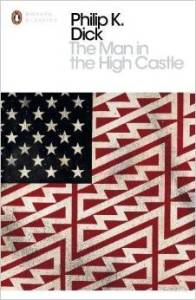 A loosely connected cast of characters living in an alternate 1962 where the Axis powers won World War II.The story takes place over a couple of weeks in California which has become part of the Japanese Empire (PSA).
A loosely connected cast of characters living in an alternate 1962 where the Axis powers won World War II.The story takes place over a couple of weeks in California which has become part of the Japanese Empire (PSA).
The Germans and Japanese are juxtaposed and the Germans some off in a solidly sinister light. Jews are still hunted to extinction and genocide has run rampant across Africa. While the Germans have technical and commercial superiority in the world they are morally bankrupt and the entire empire seems to be descending into an abyss, one crazed scheme after another.
The central theme in this story is about a fictional novel The Grasshopper Lies Heavy encountered by various characters within the story. Grasshopper describes a parallel reality where the Axis powers lost the war though not exactly in the same fashion as we’ve all learned in history. To add another meta element, the author of Grasshopper admits to writing the book with the guidance of I Ching (a more sophisticated and certainly more ancient Magic Eight Ball), which I believe is how PKD wrote parts of The Man in the High Castle. The title of the book refers to the fictional author. When the I Ching oracle is consulted as to why the book was written as it was, the response is “inner truth”, implying that even our own, seemingly real history is not really the way things happen.
PKD excels at this kind of mind warp and it’s that element that I found most enjoyable in the book.
The cultural overlay of the Japanese on American life is interesting as well. This is played out through Robert Childan, the antique shop owner who caters to wealthy and influential Japanese. He is both impressed by their civilization and as an American resentful as well. He interprets their cultural refinement as justification why they won over the Americans. Through Childan, antiques and their “historicity” are introduced into the story. It questions why two identical objects can be so different in value simply due to their role as props in ages past. Given that they (and us) appear to be living in an untrue version of historical events, is historicity even meaningful?
This books power is not in it’s portrayal of alternative historical events, nor the cast of characters, but rather in they way it questions reality.
(Amazon) The Man in the High Castle